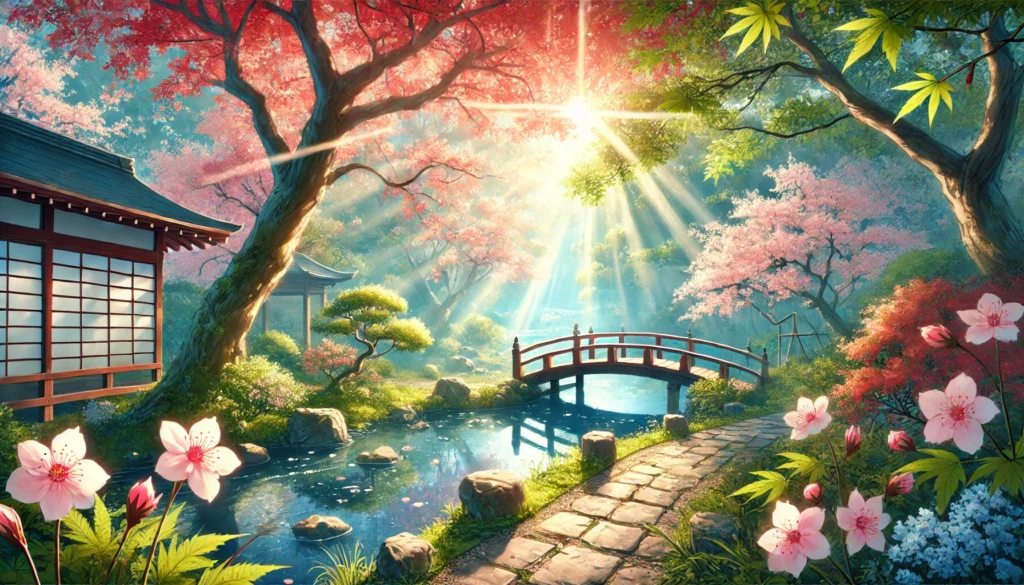Have you ever encountered a word in another language that perfectly expresses something your native tongue cannot? Japanese is particularly rich in beautiful words that capture subtle emotions, natural phenomena, and cultural concepts with remarkable precision. In this guide, we’ll explore 75 beautiful Japanese words that showcase the elegance and depth of the Japanese language.
Want to learn Japanese faster?
Book a free 15-minute call to create your personalized study plan. Get expert tips, guidance, and answers to all your questions. One-on-one!
The Poetic Nature of Beautiful Japanese Words
Japanese culture has long celebrated the beauty found in simplicity, impermanence, and the natural world. This appreciation is deeply embedded in the language itself, creating beautiful Japanese words and phrases that evoke powerful imagery and emotions through just a few characters.
What makes Japanese words so aesthetically pleasing is their ability to capture complex concepts in concise, poetic expressions. From describing the dappled sunlight filtering through leaves to the indescribable feeling of seeing someone after a long absence, beautiful Japanese words and meanings often transcend simple translation.
Most Beautiful Japanese Words for Nature and Seasons
The changing seasons hold profound significance in Japanese culture, inspiring some of the most aesthetic kanji words and expressions.
1. 桜 (Sakura) – Cherry Blossoms
Perhaps the most iconic of all beautiful Japanese words, “sakura” represents not just the stunning pink cherry blossoms that bloom each spring, but also the Japanese philosophy of appreciating beauty in impermanence. The brief, spectacular blooming of these flowers reminds us that life’s most beautiful moments are often fleeting.
2. 木漏れ日 (Komorebi) – Sunlight Through Trees
This breathtaking term describes the dancing patterns of sunlight that filter through tree leaves. It captures a specific, magical moment that nearly everyone has experienced but few languages have named.
3. 雪 (Yuki) – Snow
Beyond its literal meaning, “yuki” in Japanese poetry often symbolizes purity, silence, and the quiet beauty of winter. The character itself visually suggests falling snow.
4. 風 (Kaze) – Wind
“Kaze” represents not just moving air but often symbolizes change, freedom, and transition in Japanese literature and art.
5. 虹 (Niji) – Rainbow
A symbol of hope after difficulty, “niji” carries cultural significance beyond its literal meaning, representing the beauty that can emerge after storms.
Pretty Japanese Words for Emotions and Feelings
The Japanese language excels at naming emotional states with nuance and precision. Here are some beautiful in Japanese language terms for complex feelings:
6. 侘び寂び (Wabi-Sabi) – Beautiful Imperfection
This profound concept embraces the beauty found in imperfection and impermanence. It’s the appreciation of worn, aged objects and acceptance of life’s transient nature.
7. 切ない (Setsunai) – Bittersweet Sadness
A beautiful Japanese word describing a complex emotional state of bittersweet sadness, melancholy, or heartache that isn’t quite grief but carries a wistful longing.
8. 懐かしい (Natsukashii) – Nostalgic Fondness
Unlike simple nostalgia, “natsukashii” describes the warm, fuzzy feeling of encountering something that brings back fond memories. It’s often exclaimed when stumbling upon a childhood toy or hearing a once-beloved song.
9. 物の哀れ (Mono no Aware) – Poignancy of Things
This aesthetic concept captures the pathos of existence – the gentle sadness at the passing of things and appreciation of their impermanent beauty.
10. 心 (Kokoro) – Heart/Mind/Spirit
Unlike the English division between heart and mind, “kokoro” beautifully encompasses both emotional and thinking aspects of consciousness, along with spirit or soul.

Aesthetic Kanji Words for Abstract Concepts
Some of the most beautiful Japanese words express profound philosophical concepts through elegant kanji characters.
11. 一期一会 (Ichigo Ichie) – Once-in-a-Lifetime Encounter
This beautiful phrase reminds us to treasure each meeting and moment as unique and never to be repeated exactly the same way again.
12. 縁 (En) – Mysterious Connection
“En” describes the profound, mysterious bonds between people that transcend logical explanation – like meeting someone and feeling you’ve known them forever.
13. 間 (Ma) – Negative Space
This concept represents the meaningful empty space between objects, notes in music, or pauses in conversation – recognizing that absence can be as significant as presence.
14. 道 (Dō) – The Way/Path
Seen in terms like “chadō” (tea ceremony) or “bushidō” (way of the warrior), this beautiful Japanese word represents a path of mastery, discipline, and spiritual development.
15. 恵み (Megumi) – Blessing/Grace
This word represents the blessings, favor, or grace that come into our lives, often unexpectedly or undeservedly.
Beautiful Japanese Words for Everyday Life
Even ordinary aspects of life are captured with poetic elegance in Japanese vocabulary.
16. 温もり (Nukumori) – Warmth
Beyond physical warmth, this word encompasses the emotional warmth of human connection and comfort.
17. 優しさ (Yasashisa) – Gentle Kindness
This term describes a tender-hearted, considerate kindness that’s neither flashy nor demanding of recognition.
18. 頑張る (Ganbaru) – To Persevere
This everyday expression encourages persistence in the face of challenge, embodying the Japanese cultural value of steadfast effort.
19. 幸せ (Shiawase) – Happiness
Rather than just momentary pleasure, “shiawase” suggests a state of contentment and well-being that runs deeper than fleeting joy.
20. 瞬間 (Shunkan) – Moment
This word celebrates the significance of brief instants that can change everything or contain profound meaning.
Ready to pass the JLPT N5 fast?
Master the basics of Japanese with our complete JLPT N5 Study Guide. Step-by-step roadmap, study methods, and mock tests. All in one guide!
Table of Beautiful Japanese Words With Meanings
| Japanese | Romaji | Meaning |
|---|---|---|
| 静けさ | Shizukesa | Tranquility, quietness |
| 輝き | Kagayaki | Radiance, brilliance |
| 光 | Hikari | Light (physical or spiritual) |
| 永遠 | Eien | Eternity |
| 青空 | Aozora | Blue sky |
| 星 | Hoshi | Star |
| 花火 | Hanabi | Fireworks (literally “flower fire”) |
| 雨上がり | Ameagari | After the rain |
| 微笑み | Hohoemi | Gentle smile |
| 儚い | Hakanai | Fleeting, ephemeral |
Learn to Write Beautiful Japanese Words
Understanding the meaning of beautiful Japanese words is just the beginning. Learning to write them in their original kanji forms adds another dimension of appreciation for their elegance.
As our previous post on Japanese honorifics explained, Japanese writing combines multiple systems: kanji (Chinese characters), hiragana, and katakana. Many aesthetic kanji words derive their beauty partly from the visual composition of their characters.
For beginners interested in learning to write these beautiful Japanese words, we recommend starting with:
- 愛 (Ai) – Love
- 光 (Hikari) – Light
- 夢 (Yume) – Dream
These characters combine meaningful components that tell visual stories, making them both beautiful to look at and fascinating to write.
How to Use Beautiful Japanese Words in Conversation
Incorporating these beautiful Japanese words into your vocabulary can deepen your connection to the language and culture. Here are some practical examples:
- When appreciating spring cherry blossoms: “桜がとても綺麗ですね” (Sakura ga totemo kirei desu ne) – “The cherry blossoms are very beautiful, aren’t they?”
- To describe a nostalgic feeling: “この歌は懐かしいです” (Kono uta wa natsukashii desu) – “This song brings back memories”
- Encouraging someone facing challenges: “頑張ってください” (Ganbatte kudasai) – “Please do your best/hang in there”
For more examples of everyday Japanese expressions, check out our guide on Japanese particles, which will help you form complete sentences using these beautiful words.
Why Learn Beautiful Words?
Beyond simply appreciating their aesthetic quality, learning beautiful Japanese words and meanings can:
- Provide insight into Japanese cultural values and worldview
- Help you express thoughts and feelings that might be difficult to articulate in English
- Enhance your understanding of Japanese literature, film, and music
- Deepen your connection with Japanese-speaking friends
As you continue your Japanese language journey, these beautiful words will become treasured tools for expression and windows into a unique cultural perspective.
Free Resources for Learning Japanese Words
If you’re inspired to explore more beautiful Japanese words, check out our free Japanese learning guides where you can discover additional vocabulary resources, pronunciation guides, and writing practice sheets.

Q&A About Beautiful Japanese Words
What is the most beautiful word in Japanese?
Many consider “木漏れ日” (komorebi) the most beautiful word in Japanese because it perfectly captures the magical experience of sunlight filtering through tree leaves in a single, evocative term.
Are Japanese words naturally more poetic than English?
Japanese words aren’t inherently more poetic, but the language excels at creating concise terms for specific natural phenomena and emotional states that often require longer phrases in English.
How can I practice pronouncing beautiful Japanese words?
Listen to native speakers, use language learning apps with audio features, and practice pronouncing words aloud, paying special attention to the rhythm and pitch patterns of Japanese pronunciation.
What makes Japanese words beautiful?
The beauty of Japanese words comes from their ability to express complex concepts concisely, their connection to cultural values, and the visual aesthetics of their written forms.
Conclusion
Beautiful Japanese words offer us more than just new vocabulary—they provide unique windows into another way of seeing and experiencing the world. From the dancing light of “komorebi” to the profound philosophy of “ichigo ichie,” these terms enrich our conceptual vocabulary and remind us that language shapes perception itself.
By exploring these 75 beautiful Japanese words and meanings, we hope you’ve discovered not just new expressions, but new ways of noticing and appreciating life’s subtle moments. Whether you’re a serious language learner or simply a lover of beautiful words, Japanese offers an endless landscape of linguistic beauty to explore.




